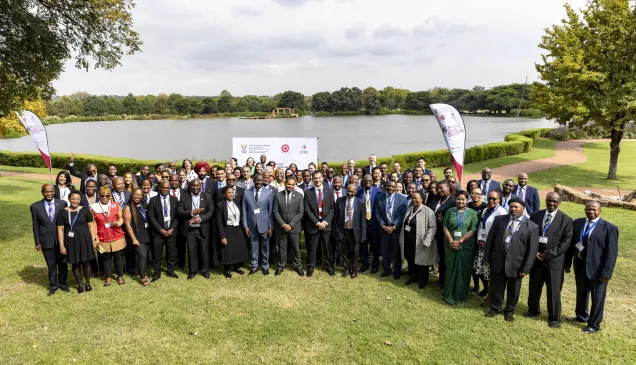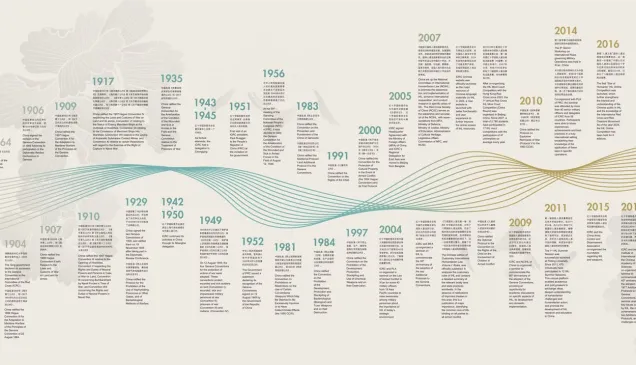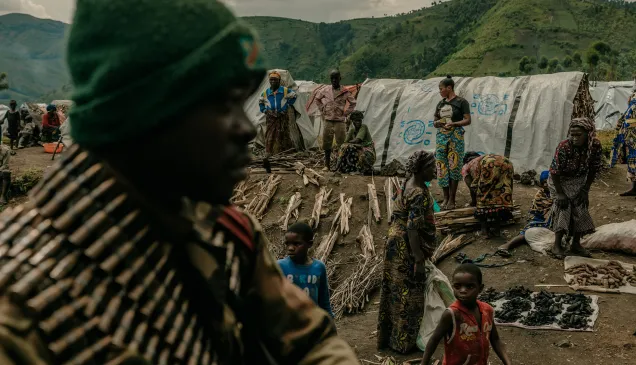ICRC activities in Bangladesh in 2014
A summary of activities carried out by the ICRC in Bangladesh in 2014.
Assuring medical support
In 2014, the Bangladesh Red Crescent Society (BDRCS), with support from the ICRC:
- provided first aid to over 80 people wounded during political violence in Chittagong and Dhaka divisions; the seriously injured were referred to hospitals, several of which received ICRC medical supplies;
- trained police personnel and members of the student wings of political parties in facilitating the safe passage of medical services, and also enhanced their first-aid skills and donated first-aid kits.
Assisting victims of violence
Households in seven districts affected by intercommunal and political violence in 2014 received assistance from the BDRCS and the ICRC in the form of:
- food and essential household items provided to 3,679 people (706 households) in Khulna and Rangpur divisions;
- cash grants to 1,024 people (163 households) in Dhaka, Chittagong and Rangpur divisions to enable them to repair damaged homes and/or shops;
- cash grants to 98 people (14 households) of a minority group to help them repair homes and/or shops damaged during violent clashes with a neighbouring community.
Ensuring sustainable livelihoods
In 2014, the ICRC in partnership with BDRCS helped 2,008 people (365 households) in Khagrachari and Bandarban districts of Chittagong Hill Tracts (CHT) to start up income-generating activities centred mainly on agriculture, livestock and local crafts.
Improving health care
In 2014, support from the BDRCS and the ICRC enabled over 6,000 patients to benefit from improved health care in the areas of emergency, pediatric and gynecological services at two sub-district health facilities in Cox's Bazar district. The ICRC also supported work to improve water, sanitation, hygiene and waste management at the centres.
Providing limb-fitting and physical rehabilitation services
In 2014 the ICRC:
- provided 199 prostheses and 1,160 orthoses to 818 patients in ICRC-supported Centre for the Rehabilitation of the Paralysed (CRP) branches in Savar and Chittagong;
- helped to establish a new school offering the first diploma course on prosthetics and orthotics in the country;
- supported the Bangladesh Health Professions Institute CRP facility in developing its curriculum, acquiring equipment and granting scholarships to the school's first batch of ten students; two physical rehabilitation professionals pursuing studies abroad also received ICRC funding;
- organized, with the cooperation of the Bangladesh Cricket Board and supported by the England and Wales Cricket Board and the British High Commission in Dhaka, the first ever National Physical Disabled Cricket Seminar and Training Workshop to promote social inclusion activities for the physically disabled.
Restoring family links
Migrants detained abroad and their families living in Bangladesh continued to benefit from the restoring family links (RFL) service of the Red Cross and Red Crescent tracing network, in cooperation with the Bangladeshi Foreign and Home Affairs Ministries.
In 2014, the ICRC and BDRCS:
- helped the families of Bangladeshi detainees, including those held in Jordan, Lebanon, Malaysia, Myanmar and Thailand, and of other nationals detained abroad, receive and/or send 259 Red Cross messages; in addition, some 765 oral messages were relayed to separated family members;
- assisted the return of two Bangladeshi women and three unaccompanied minors previously detained abroad back to Bangladesh; one also received a cash grant from the ICRC to help facilitate her reintegration into society;
- helped a number of foreign detainees re-establish contact with relatives or notified their embassies of their situation through the RFL service; three Indian detainees received support to help ease post-release circumstances;
- made follow-up visits to 25 families who had lodged tracing requests with the BDRCS for people missing following the collapse of a building in Savar in 2013 ; the families' difficulties, including their need for access to compensation mechanisms, were also brought to the attention of various authorities.
Supporting foreign detainees
In 2014, the BDRCS with the support from the ICRC improved the hygiene conditions of 789 foreign detainees in 39 prisons with assistance kits which included body and laundry soaps, towels, shirts and toothpaste. Winter clothes were also distributed to 11 boys and 13 girls in two jails.
Managing human remains
In 2014 the ICRC:
- conducted a five-day training course on the management of human remains for 22 representatives from 12 relevant organizations;
- ran a sensitization session in Khulna division for 35 representatives from the police service, the BDRCS and an Islamic charity.
Promoting international humanitarian law
Meetings with the ICRC and the BDRCS helped the Bangladeshi authorities, the armed and security forces and key civil society representatives learn more about issues relating to international humanitarian law (IHL).
In 2014, the ICRC:
- maintained its cooperation with the armed forces, paramilitary forces and the police service to incorporate IHL and international human rights law into their training and operational activities;
- initiated new contacts with training institutions such as the School of Infantry & Tactics and the Border Guards Training Centre & School;
- organized training sessions on IHL and international human rights law for almost 1,000 law enforcement and military personnel;
- helped some 40 newly trained first aid trainers to begin conducting their own first aid courses in their respective organization's training centres;
- sponsored the participation of 71 government officials in three IHL conferences held for South Asian states;
- organized, in conjunction with the newly formed National IHL Committee, a workshop on the Geneva Convention Implementing Act and its protocols to further the incorporation of IHL into domestic law;
- co-hosted the 10th National Round of the Moot Court competition;
- addressed 112 principals of Islamic secondary schools on the subject of links between IHL and Islam;
- acquainted 25 officers of the Islamic Foundation & Imam Training Academy with basic first aid training and knowledge of the Red Cross/Red Crescent Movement.
Working in partnership with the Bangladesh Red Crescent Society
The ICRC worked closely with the BDRCS to carry out assessments of the needs of people affected by violence and/or disasters, and to provide first aid and general health care, and family-links services.
In 2014, the ICRC helped to:
- distribute 10,000 blankets to people in different parts of the country during cold weather;
- enhance the skills of BDRCS staff and volunteers from 62 districts in carrying out humanitarian activities, particularly through exercises in the Safer Access Framework and refresher training sessions on tracing services;
- improve the capacity of emergency first aid teams through a study visit to Egypt, in conjunction with the Egyptian Red Crescent Society.



